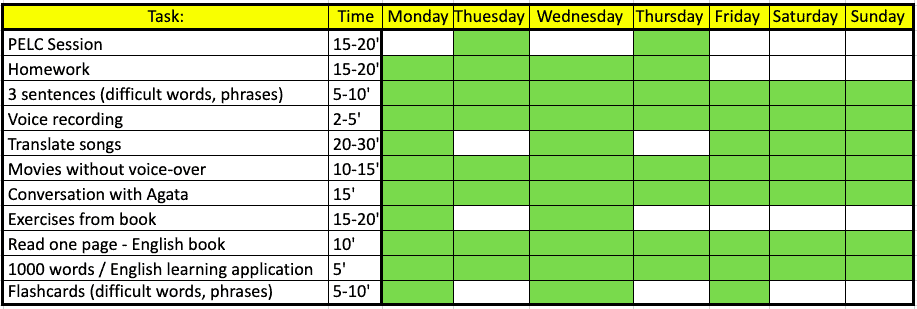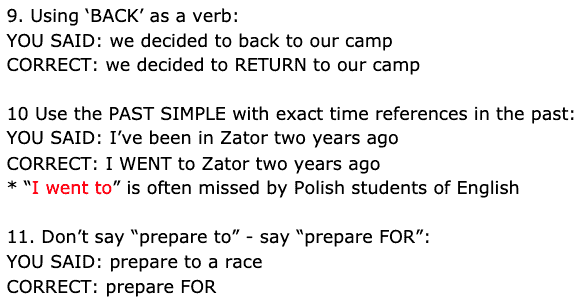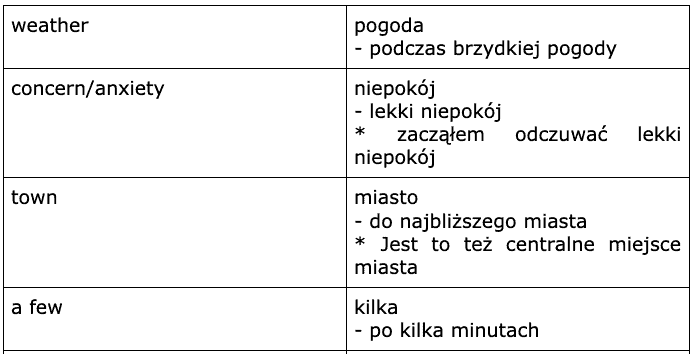4 awesome ways to stay motivated when learning a language
This time around, we’re going to take a look at how you can stay motivated when learning a language.
I really admire my students, especially those who’ve been grafting away with me for a number of years.
Some of them have been able to stay motivated to learn English despite facing huge changes and difficulties in their lives. Indeed, I’m currently teaching a student who’s shown tremendous resilience and exceptional motivation levels while battling cancer.
Let’s check out four methods to help you stay motivated when learning a language:
1. VARIETY IS THE SPICE OF LIFE - MAKE A DOABLE PLAN AND STICK TO IT
I’ve got one student, Artur, who proves that class time with a tutor is simply not enough to make significant progress in learning a language.
I’d always known that this student was a real trier.
So, when he sent his “English development” plan just the other day, I knew that he’d initiated “mission self-improvement” for real:

A student's personal language learning schedule
On this blog, I’ve paid scant attention to the need to incorporate VARIETY into one’s language learning schedule.
The tasks that Artur has come up with should prevent boredom from setting in. From transcribing his voice recordings and self-correcting mistakes, to translating songs and writing personalised sentences on his “fossilised errors list”, variety really is the spice of life for Artur.
Here's part of Artur’s “fossilised errors list”:

Artur is pushing hard to overcome the intermediate plateau and become a very fluent, advanced-level speaker.
With his organisational skills and motivation levels, he might just break out of the intermediate plateau over the next six months.
2. JUST IMMERSE YOURSELF IN A NOVEL OR MEMOIR
I know this is the age of Youtube and social media.
However, you can’t beat a good novel or memoir to help you stay motivated when learning a language.
I recently extolled the virtues of polyglot Kato Lomb’s reading method when it comes to learning second languages.
Firstly, you should read a book to get its gist. Moreover, you should only work with those words or phrases which you’re sure you know the meaning of, or you can safely guess from context. You can refer to a dictionary if necessary for those words and phrases which look familiar.
The next time you read the book, you should certainly make use of a good dictionary to check the meaning of unknown words which you assume would be useful.
All in all, Lomb’s method revolves around that magical journey of discovery which all language learners should strive to experience.
Look at me. Eight years without any contact with Polish.
My book of choice - a travel memoir - has reignited my passion for the language.
3. A LANGUAGE LEARNING STRATEGY IS YOUR BEST ALLY
I recently wrote about how I’ve returned to learning Polish after an eight-year layoff.
As mentioned in the previous section, I bought a Polish language book to help me get to grips with the language again.
Slowly but surely, I’m going through the book and focusing on those words, phrases and sentences I’m sure I know the meaning of or can confidently guess from context.
It’s been no secret on this blog that I favour PELC’S Word-Phrase Table strategy to record words and phrases, and as a means to stay motivated when learning a language.
So, to get my Polish back up to speed, I’ve been doing the following during my first reading of this travel memoir:
1. Recording commonly-used words and phrases which I recognise;
2. Noting down the appropriate context in the book in which these words and phrases appear. I record this contextual information after a dash (-);
3. Recording facts or some of the writer’s feelings after a star (*). There’s a possibility that I might be able to use these short sentences in the conversations I have in Polish in the future.

I haven’t got a Polish tutor right now as I'm firmly in independent language learner mode.
Just going back to when I learned Serbian. It was my tutor that checked the personalised sentences I added to my Word-Phrase Table.
I went on to use many of these personalised sentences when I spoke Serbian.
To mix things up, use different fonts or add colour to your Word-Phrase Table. After all, visualisation is a fundamental part of the language learning process.
4. BE A HISTORY BUFF IN ORDER TO STAY MOTIVATED WHEN LEARNING A LANGUAGE
I really do believe that language learners need to create an emotional connection with the language they’re studying.
You got it.
Read up on a language’s origins and evolution.
It’s been fascinating for me to learn about the origins of Polish in the 10th century. For instance, I’ve learned that Poland adopted Christianity in 966. Hence, Latin, as the language of the Church, gradually came to shape Old Polish (język staropolski).
In addition to the Church, languages belonging to Poland’s western neighbours also had an impact on Polish. For instance, the Czech language had an important influence on Polish in the tenth century, and again in the fourteenth to fifteenth centuries.
I could reel off more facts, but I think I’ve made my point.
Reading up the origins of the language you’re learning helps you to form a lasting bond with that language.
CONCLUSION
The aforementioned methods to stay motivated when learning a language are all based on my experience as a teacher of English and language learner myself.
Honestly, having one long class per week with a tutor who only uses coursebooks probably won’t inspire you nor help you to reach your goals.
Hence, the saying “variety is the spice of life” really does ring true when it comes to learning a language.



